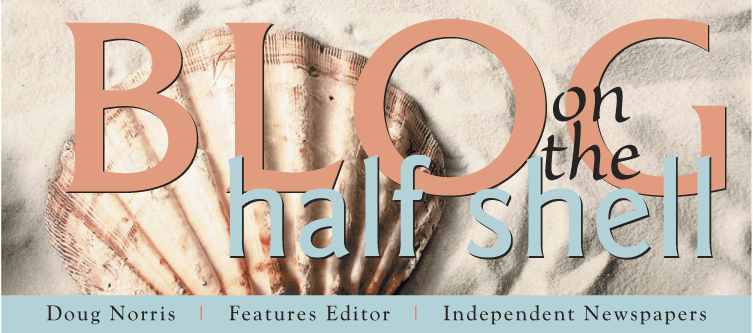Artist Maya Lin was selected to design the 2010 poster for the Spoleto Festival USA, one of the world’s top performing arts festivals, held annually in Charleston. For this year’s poster, titled “From Rhode Island to South Carolina,” she created a double panel deconstructed from a road atlas. The first presents the Ocean State in portrait format and the second shows the Palmetto State in landscape format. In the center of each, there is a crater-shaped hole (Rhode Island’s looks like an oyster), as if something has been dug away from its core.
Lin is no stranger to controversy. She is most famous for creating the Vietnam Veterans Memorial in Washington, D.C., which was viciously criticized at first but is now iconic – one of the most celebrated public art works of our time and the standard for what has become almost cliche in war memorial building.
Since the poster appeared, speculation has run rampant in the lower Carolina. Some say it’s merely a graphic association, since maps of Rhode Island and South Carolina appear in alphabetic order on an atlas. The festival’s general director Nigel Redden said that Lin revealed “a third dimension that typically we don’t see,” referring to the ambiguous relationship between the two states. Whatever the case, many are annoyed that Lin gave Rhode Island so much play in a festival that is one of South Carolina’s cultural highlights.
Trying to decipher the riddle, The Post and Courier of Charleston, S.C., reported that:
Both states are original New World colonies; both relied heavily on boats (for whaling in one case, slavery in the other); both are on the East Coast; both have two words in their name.
In a poll on public reaction to the poster conducted by the newspaper, 88 percent voted either “Don’t understand it” or “Don’t like it,” with only 12 percent saying they loved it or liked it.
More from The Post and Courier:
Jennifer Blackman, who works at the S.C. Aquarium, saw the poster at Rising High Cafe on East Bay Street.
“I’m trying to figure it out,” she said. “It’s the Rhode Island thing that’s confusing.”
Ellen Dressler Moryl, director of the city of Charleston’s Office of Cultural Affairs and chief curator of the Piccolo Spoleto Festival, said the excavations in Lin’s image look like ears and seem to be asking, “Are you really listening?”
At first baffled by the Rhode Island-South Carolina connection, Moryl experienced a bolt of understanding. Rhode Island, she said, has the oldest synagogue building in America; Charlestown has the oldest synagogue in continuous use in America.
That must be it, she said.
On the surface it seems a strange match. Two states: One Blue, one Red. One Union, one Confederate. They have Charleston; we have Charlestown. Rhode Island Red, South Carolina Gamecock. We share a few pirates in common. The same ocean. But otherwise, what’s the connection?
My two cents: It’s all about slavery and cultural identity. South Carolina was steeped in the slave trade and plantation culture, and in modern times it endured a very public controversy over the decision to continue flying the Confederate battle flag over the state house (until finally removing it in 2000). Meanwhile, Rhode Island’s role in the culture of slavery has received extensive examination in the press, the arts and academic circles in recent years. This November residents will be voting on a controversial referenda question about whether to keep the official name as “The State of Rhode Island and Providence Plantations.” So Lin’s rendering is a slightly subversive, somewhat cryptic tale and history lesson of two states that have more in common than they know.
Whether that's true or not, most South Carolinians seem to be boycotting the Rhode Island-centric poster. But Rhode Islanders looking for something to hang next to “Dogs Playing Poker” on their walls can purchase a copy online for $25.
This week’s question: “With what state in the Other 49 does Rhode Island share the most in common, and why?”

